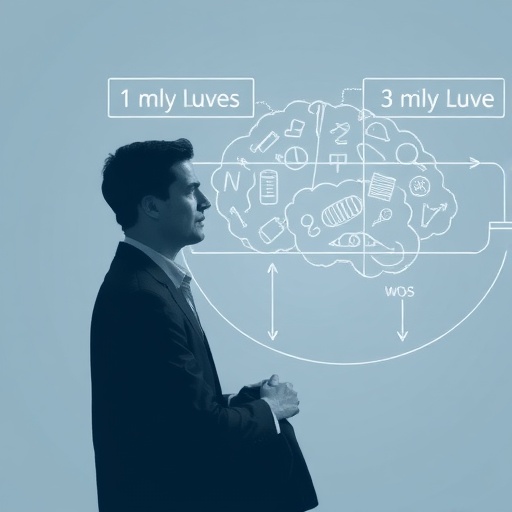In the realm of psychological well-being, the concept of perceived control—the subjective belief that one can influence events in their daily life—has long held a prominent position. A groundbreaking study recently published in Communications Psychology reveals fascinating insights into how this sense of control dynamically interacts with the resolution of daily stressors and how this relationship evolves across a significant span of adulthood. The research, conducted by Witzel, Cerino, Stawski, and colleagues, meticulously tracked middle-aged adults over a decade, illuminating the intricate processes behind stress management and personal agency.
At the heart of this investigation lies the recognition that stressors are an unavoidable component of everyday life, ranging from minor irritations like traffic jams to more demanding challenges such as workplace conflicts. Historically, scholars have understood that perceived control can act as a buffer against the negative effects of stress. However, this new longitudinal approach offers a rare glimpse into the way perceived control and stress resolution interact on a day-to-day basis and how their bond strengthens with age and experience.
The study employed a robust daily diary methodology, capturing real-time data over multiple measurement bursts across a ten-year period. This design allowed the researchers to observe fluctuations within individuals as well as developmental trends across the adult lifespan. Participants reported on both their feelings of control and the outcome of stressors they confronted each day, enabling analysis of temporal linkages between mindset and practical coping outcomes.
What emerged was a compelling pattern: as adults aged, the positive association between perceived control and effective stress resolution became more pronounced. In other words, older adults who felt greater control over their daily circumstances were significantly better at overcoming stressors compared to their younger counterparts exhibiting similar levels of control. This suggests that the ability to translate subjective control into tangible problem-solving gains strength over time.
Underlying this phenomenon could be a host of psychological and experiential factors. With prolonged exposure to varied life challenges, adults may develop more refined coping strategies, gain emotional regulation skills, or cultivate cognitive appraisals that enhance control perceptions. Additionally, changes in social roles, responsibilities, and emotional regulation capacity might contribute to this deepening connection between control and stress management.
The implications of these findings extend far beyond academic interest. As mental health challenges proliferate globally, understanding how perceived control mediates stress resolution offers actionable clues for interventions aimed at bolstering psychological resilience. Tailoring support to foster and maintain perceived control throughout adulthood could empower individuals to better navigate the inevitable ups and downs of life.
Intriguingly, the study challenges deterministic views suggesting that stress-related vulnerabilities typically increase with age. Instead, it presents a nuanced narrative where aging is accompanied by strengthened capacities to marshal internal resources for stress management. This aligns with evolving theories in lifespan psychology emphasizing adaptive processes rather than decline.
Moreover, the rigorous daily diary context allows for a highly granular analysis of the temporal sequencing between control perceptions and stress resolution. By disentangling same-day effects and prospective associations, the researchers provide evidence for a causal interplay rather than mere correlation. This adds to the growing appreciation of the dynamic interplay between cognition, emotion, and behavior in the stress process.
From a neurobiological perspective, one might speculate that neuroplastic changes in brain circuits related to executive functioning and emotion regulation contribute to the fortified relationship observed in older adults. Such adaptations may underlie improved capacity to exert intentional control in the face of stress, though further interdisciplinary work is needed to unpack these mechanisms.
Furthermore, gender, socioeconomic status, and cultural context likely modulate the strength and shape of the perceived control-stress resolution dynamic. Future research expanding on these demographic dimensions will help tailor mental health strategies more equitably and effectively across diverse populations.
The methodological rigor exemplified by this longitudinal design serves as a model for future investigations into the microprocesses of psychological resilience. By combining intensive repeated measures with broad temporal scales, the study reconciles the tension between capturing momentary experiences and detecting long-term developmental patterns.
Ultimately, this research underscores that psychological constructs such as perceived control are not static traits but malleable, evolving capacities shaped by ongoing interactions with life circumstances and personal growth. Recognizing this dynamism unlocks potential for targeted interventions during midlife and beyond, a period critical for solidifying lifelong well-being trajectories.
In sum, the decade-long evidence presented by Witzel and colleagues revitalizes our understanding of the interplay between mind and environment in the daily grind of adult life. It champions a hopeful message: perceived control is a powerful, adaptable resource that grows more instrumental in helping individuals overcome daily stress as they journey through adulthood.
As the pressures of modern life escalate, fostering perceived control may provide a keystone in public health strategies aimed at alleviating stress-related disease burden. By empowering individuals with skills and mindsets to reclaim agency in their daily experiences, societies can promote more resilient, fulfilled populations.
This landmark study sets a new benchmark for psychological research by threading together moment-to-moment data and lifespan perspectives. Its implications ripple across clinical psychology, health policy, and personal development domains, warranting widespread attention and application.
The findings invite reflection for everyone navigating the complexities of adult life: perceived control is not merely an abstract ideal but a practical, evolving tool that can enhance well-being, sharpen stress resilience, and foster a sense of mastery amid life’s inevitable challenges. Embracing and cultivating this capacity may be one of the most profound investments in quality of life one can make on the journey through adulthood.
Subject of Research: The evolving relationship between perceived control and resolution of daily stressors across adulthood.
Article Title: Daily association between perceived control and resolution of daily stressors strengthens across a decade of adulthood.
Article References:
Witzel, D.D., Cerino, E.S., Stawski, R.S. et al. Daily association between perceived control and resolution of daily stressors strengthens across a decade of adulthood. Commun Psychol 3, 130 (2025). https://doi.org/10.1038/s44271-025-00313-7
Image Credits: AI Generated




